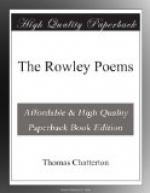Accordingly on Friday the 24th August 1770 he tore up his manuscripts, locked his door, and poisoned himself with arsenic.
Southey, Byron, and others have supposed that Chatterton was mad; it has been suggested that he was the victim of a suicidal mania. All the evidence that there is goes to show that he was not. He was very far-sighted, shrewd, hard-working, and practical, for all his imaginative dreaming of a non-existent past; and this at least may be said, that Chatterton’s suicide was the logical end to a very remarkably consistent life.
Chatterton’s character has suffered a good deal from three accusations vehemently urged by Maitland and his eighteenth-century predecessors. The first is that the boy was a ‘forger’; the second that he was a freethinker; the third that he was a free-liver.
To examine these in turn: the first admits of no denial as a question of fact, but justification may be pleaded which some will accept as a complete exculpation and others perhaps will hardly comprehend.
Chatterton could only produce poetry in his fifteenth-century vein; his imagination failed him in modern English. No one who has any appreciation of Rowley’s poems will consider that the African Eclogues are for a moment comparable with them. If he was to write at all he must produce antiques, and, as it happened, interest had been aroused in ancient poetry, largely by the publication of Percy’s Reliques and of the spurious Ossian. Appearing at this juncture, then, as ancient writings taken from an old chest, his poems would be read and their value appreciated; while no one would trouble to make out the professed imitations—not by any means easy reading—of an attorney’s apprentice. Probably if an adequate audience had been secured in his lifetime, Chatterton would have revealed the secret when it had served its purpose—just as Walpole confessed to the authorship of Otranto only when that book had run into a second edition.
To the second count of the indictment no defence is urged. Chatterton was too honest and too intelligent to accept traditional dogmatics without examination.




